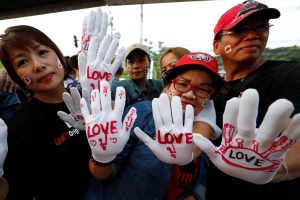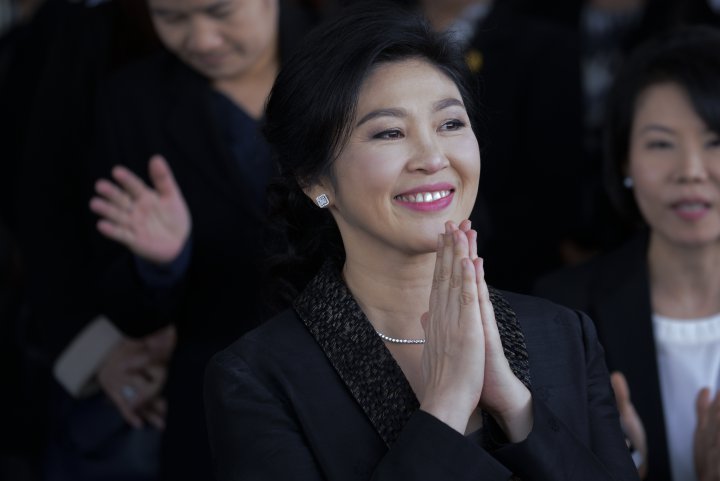This material belongs to: Time.
Thailand’s Supreme Court has issued an arrest warrant for former prime minster of Thailand Yingluck Shinawatra after she failed to show up in court Friday to hear the verdict of a negligence trial that is likely to further polarize the kingdom’s much-divided political system.
The highly-anticipated verdict has now been postponed until Sept. 27 and if convicted, Yingluck faces up to 10 years in prison and a lifetime ban from politics. The court in the capital Bangkok said it did not believe a statement issued by her lawyers that said she couldn’t attend the hearing because she was ill.
According to sources within her Pheu Thai party, Yingluck has fled abroad, reports the BBC and Reuters. Her exact whereabouts are unknown.
Thailand’s first female prime minister is accused of knowing about alleged corruption in her administration’s flagship rice-subsidy scheme, a failed enterprise that won her the 2011 election but cost the economy $15 billion by one estimate.
Yingluck, now 50, has always denied any wrongdoing. “The rice pledging scheme is a good and beneficial public policy based on sound economic principles,” she said while speaking to supporters on Aug. 1.
Yingluck maintains that the charges against her are political, orchestrated by the military to halt the Shinawatra family machine, which through various parties has dominated the country’s political landscape since 2001, when her brother Thaksin Shinawatra was elected prime minister.
The former telecommunications billionaire was enormously popular with the country’s rural poor and his populist healthcare and debt relief programs drew huge political support. But he was despised by Thailand’s pro-establishment elites and allegations of corruption followed. Thaksin was ousted by the military in a coup in 2006 and convicted of corruption in absentia. He fled to Dubai, where he lives in self-imposed exile.

Many Thais regard Yingluck, who was a political novice when she swept to power, as a puppet of her brother. Critics saw the failed rice-pledging scheme as corrupt, benefiting local officials. The legislation involved buying rice paddy from farmers at almost double market prices, with the intention of driving up world prices. But India and other countries ramped up production to capture the market, resulting in Thailand losing it’s status as the world’s biggest rice exporter. The scheme left the country with mountains of unsold rotting rice it couldn’t budge.
But it was an amnesty bill, proposed by Yingluck in 2013 that ignited mass street protests against her administration for half a year. The bill would have allowed her brother Thaksin home from exile as a free man. Amid anti-government demonstrations and just weeks in advance of a military coup led by General Prayuth Chan-ocha, a constitutional court convicted Yingluck for abuse of power in May 2014 over the transfer of her National Security Council chief to another position. She was then removed from office and later impeached on corruption charges in 2015.
The military and anti-Shinawatra Thais are pushing for a guilty verdict. Yingluck is already banned from politics until 2020 and a weakened clan would benefit the junta. But a conviction may not necessarily be a total win for the military, which used Yingluck’s political crisis to legitimize seizing power. Analysts say further punishment could backfire by galvanizing her supporters.
“The May 2014 coup has come home to roost,” political scientist Thitinan Pongsudhirak, at Bangkok’s Chulalongkorn University told TIME on Tuesday. “The military needed a guilty verdict to rationalize their putsch … but going too far can actually make her a martyr and even more popular.”
A harsh sentence is likely to rally Yingluck’s supporters in the north and northeast, known as the Red Shirts, to unite behind her Pheu Thai party. But with the military suppressing all dissent, any unrest could “spark more trouble and resistance for the regime,” Paul Chambers, lecturer at the college of ASEAN studies at Thailand’s Naresuan University, told TIME.
However, the junta has delayed fresh elections to return the kingdom to democracy until 2018, and there are concerns it intends to hold onto power. “The military could use the rationale of such resistance to claim a need to stay in power longer in order to ‘pacify’ pro-Shinawatra Thais,” Chambers says.

The junta, ruling under the name National Council for Peace and Order, rewrote the country’s constitution — Thailand’s 20th — following a referendum that was seen by pro-democracy activists as a means to enshrine the army’s political power and quash the dominance of the Shinawatra dynasty. A provision in the new constitution allows for an unelected prime minister, and the upper house entirely elected by the military.
Since the coup, a ban has been imposed on political campaigning and gatherings, hundreds of critics of the junta have been detained under defamation laws, and lese majeste prosecutions, ostensibly targeting those who criticize the royal family but in practice used for suppressing all manner of dissent, have skyrocketed.
“Real power in Thailand is held by a parallel state of monarchy and military, with the latter as a junior partner which, once democracy returns, will be able to overshadow any elected government that comes to office,” Chambers says.
It’s within this political climate that Yingluck was tried and convicted. For many, a guilty verdict would signal that Thailand’s court system is in the pocket of the junta.
“Given that Yingluck was far removed from the actual decisions on the rice pledging scheme, a guilty verdict under military rule would make Thailand’s judiciary look like a kangaroo court system where rule of law depends upon the references of the military leadership and senior aristocracy,” Chambers says.
With the military firmly in power and Yingluck’s supporters flocking around her, the verdict will only bring Thailand’s factious political system “more partisanship and polarization,” says Pongsudhirak.
“What Thailand needs is a compromise but it is nowhere in sight.”


